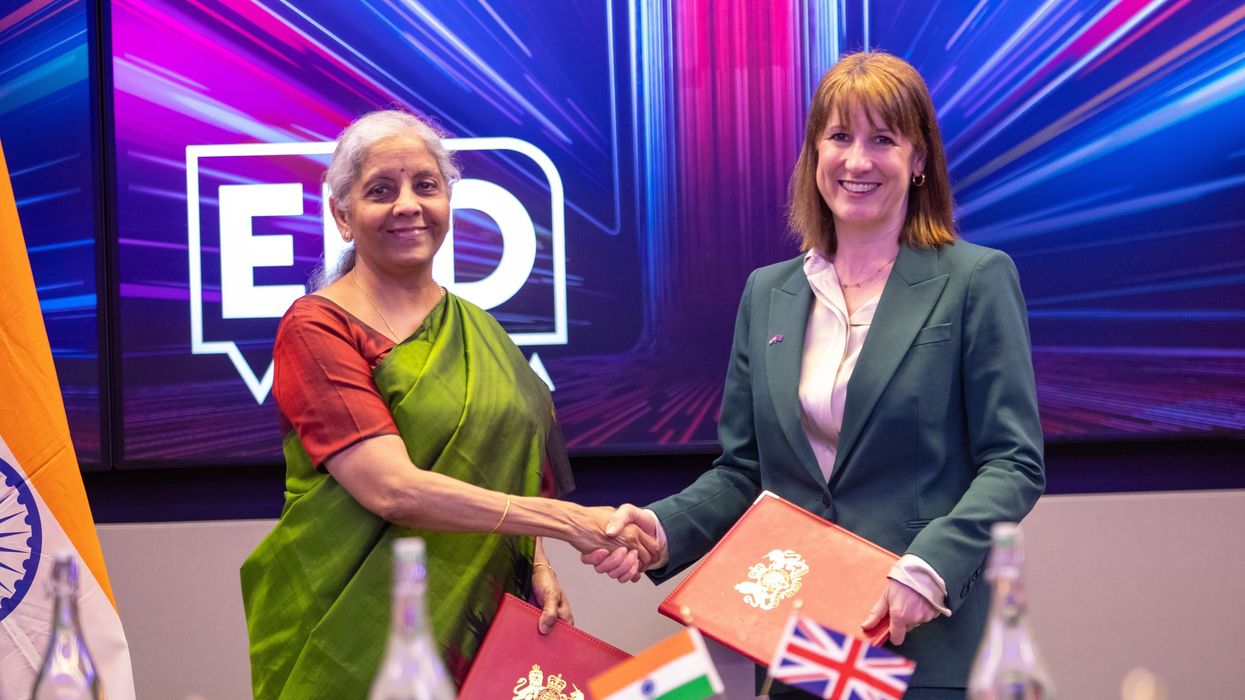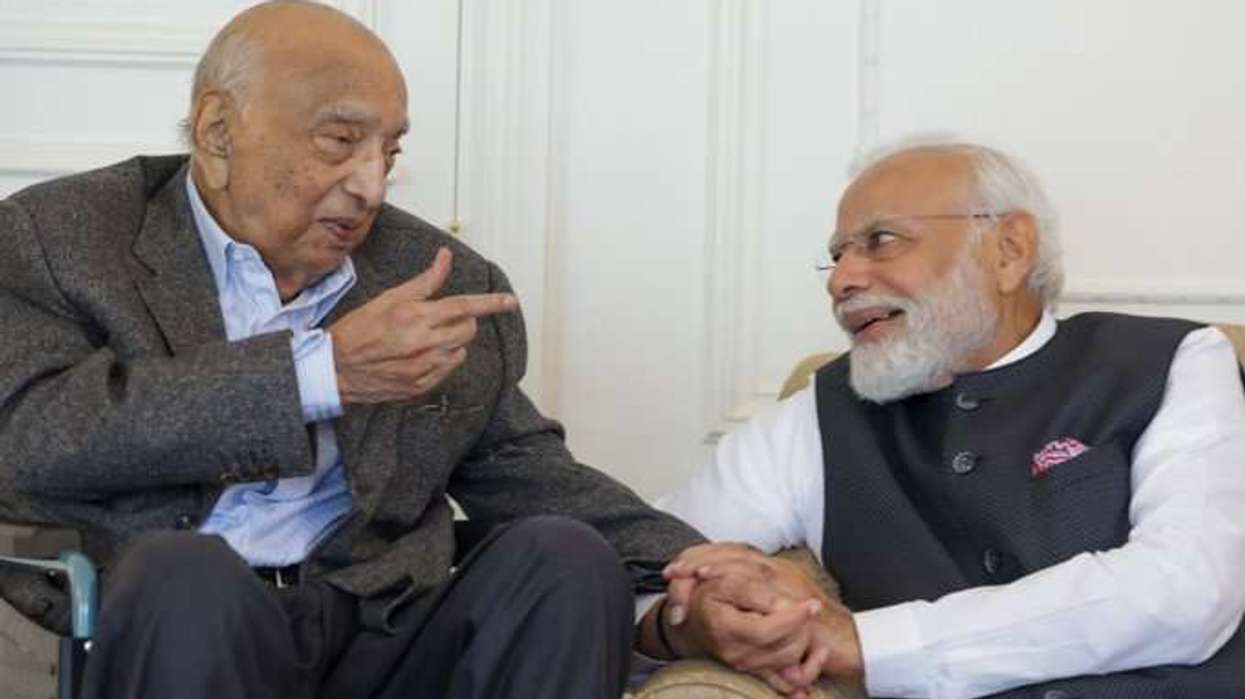BRITAIN is eyeing imminent trade deals with India and the US as uncertainty over American president Donald Trump’s trade policies and his constant back-and-forth on tariffs continues to cast a cloud over markets and the global economic outlook.
Some stability has returned to markets after last week’s rollercoaster ride over Trump’s stop-start tariff announcements, but speculation over new levies on highend technology and pharmaceuticals has kept investors on edge.
US vice-president JD Vance on Tuesday (15) said there is a good chance the US and the UK will strike a “great agreement” on trade due to Trump’s love for the country and its royal family.
In an interview with UnHerd, Vance said the US administration was working very hard with prime minister Sir Keir Starmer’s government.
“The president really loves the UK,” he said. “He loved the Queen. He admires and loves the King. It is a very important relationship. And he’s a businessman and has a number of important business relationships in (Britain).”
Citing a US cultural affinity for Britain, Vance added: “I think there’s a good chance that, yes, we’ll come to a great agreement that’s in the best interest of both countries”.
Britain was spared the most punitive treatment in Trump’s initial tariff announcement, due to the two nations enjoying a largely balanced trade relationship. Still, UK imports in the US now incur a 10 per cent charge while its steel and car sectors incur a rate of 25 per cent.
Officials from both countries have been locked in talks for weeks that initially focused on boosting cooperation on artificial intelligence and tech, but could also expand to include food and other goods.
Trump imposed 10 per cent tariffs on goods from all countries and higher tariffs for countries the administration said have high barriers to US imports. However, last week he paused this for 90 days.
Meanwhile, the UK is also said to be closer to finalising a free trade agreement with India, talks for which began more than three years ago.
Negotiators from the Department of Business and Trade last week said 90 per cent of the deal had been agreed and that some outstanding issues related to whisky, cars and pharmaceuticals.
Chancellor Rachel Reeves said, “In a changing world, it is imperative we go further and faster to kickstart economic growth. We have listened to British businesses, which is why we’re negotiating trade deals with countries across the world, including India, so we can support them and put more money in people’s pockets as part of our ‘Plan for Change’. Our relationship with India is longstanding and broad and I am delighted with the progress made throughout this dialogue to develop it further.”
Her remarks came as India’s finance minister Nirmala Sitharaman was in London last week and met prime minister Sir Keir Starmer, the chancellor, business secretary Jonathan Reynolds as well as business leaders and investors from the UK.
Sitharaman welcomed the UK government’s “great deal of enthusiasm” around the FTA and expressed hope that it will be signed “sooner rather than later”.
The Indian minister last week chaired an India-UK Investor Roundtable in London, attracting around 60 UK investors representing various pension funds, insurance companies, banks and other financial institutions.
Last Tuesday (8)’s meeting outlined the priorities of the Indian government for enabling sustained economic growth and investment opportunities, a statement from the Ministry of Finance said.
Reeves also reiterated the UK government’s commitment to continue to make “rapid progress in completing a deal”, recognising its importance in fostering economic growth for both nations.
“What we’re trying to do in our Free Trade Agreement is to reduce tariff and non-tariff barriers that suppress trade between countries. I believe that free and open trade benefits countries, as does free flows of investment, and that’s why we are seeking with India to reduce those barriers,” she said.

“That said we’re not waiting for a Free Trade Agreement to boost trade and investment between our countries as seen in today’s announcements of significant investment both ways from Indian firms into the UK and vice versa.”
Reynolds said, “Both the UK and India are committed to delivering economic growth and giving businesses the confidence and stability they need to expand. That is why we are continuing to negotiate towards an ambitious trade deal that unlocks opportunities both at home and abroad for British businesses and supports our plan for change.”
Meanwhile, US treasury secretary Scott Bessent said on Monday (14) that a China-US deal could be done, in an apparent olive branch as the two economic powerhouses trade tariff threats.
The US president has hammered China with duties of up to 145 per cent, while Beijing has imposed retaliatory measures of 125 per cent. Other countries are negotiating with Washington.
Trump aide Kevin Hassett said the White House had received “more than 10 deals where there’s very, very good, amazing offers made to us”, but did not specify from which countries they came.
This could include India, according to South Korea’s acting president, Han Duck-soo, who said on Monday (14) that Trump appeared to have directed talks on tariffs to begin immediately with South Korea, Japan and India, Yonhap News Agency reported.
Agneshwar Sen, trade policy leader at EY India, told Eastern Eye, “The ‘trade war’ is upending the structured and orderly multilateral system in place since the General Agreement on Trade and Tariff (GATT) in 1947. If all countries follow a similar approach of ‘reciprocity’ in determining their tariffs on imports from their trading partners today, it will recreate the ‘spaghetti bowl’ that GATT replaced.”
He added, “As responsible major players in the global trading world, it is incumbent on India and the UK to strengthen the multilateral system, that has immensely benefited us. Instead of going for the best, ie, a high standard free trade agreement maximising all of India’s and the UK’s expectations, it may be advisable to lock in the areas where there is broad agreement and incrementally move towards consensus on the rest. Given the US desire to sign off on its bilateral agreements, time is of the essence.”

The UK and India are the sixth and fifth largest global economies respectively, with a trade relationship worth £41 billion and investment supporting more than 600,000 jobs across both countries.
William Bain, head of trade policy at the British Chambers of Commerce (BCC), said improving trade and investment partnerships with Asian countries, especially India, should be a priority for the UK.
“British businesses have high hopes that we can see a free trade deal reached between India and the UK in the coming months. One of the key messages from UK businesses is improving our trade and investment links with India, south and southeast Asia as a top priority. Together we can reach a balanced agreement that opens access in product and services markets and lowers tariffs at a vital time for both countries,” Bain told Eastern Eye.

“A US-China trade war risks lowering global economic growth, affecting UK and Indian exports to the US alike. Businesses want to see tariffs on steel, aluminium and automotive products lowered, the prospect of high reciprocal tariffs ended, and no extension of tariffs into areas like pharmaceutical goods.
“The BCC is urging the UK and US governments to reach a deal to provide tariff relief and investor certainty. We know businesses in India, facing higher tariffs on many goods sectors in less than 90 days’ time, share that ambition too.”
Trump remains firm that the tariffs will bring critical manufacturing back, with White House spokesman Kush Desai saying on Monday (14) that “the entire administration is committed to working on Trump Time” – apparently referring to moving quickly – on the matter.
Late last Friday (11), US officials announced exemptions from the latest duties against China and others for a range of high-end tech goods such as smartphones, semiconductors and computers.
But Trump suggested last Sunday (13) that the exemption would be only temporary and that he still planned to put barriers up on imported semiconductors and much else.
Satish Jayachandran, associate dean and James F Kane professor of business, University of South Carolina, said, “Global economic turbulence, fuelled by US tariffs, is adding serious urgency to forging new trade partnerships.

“While India-UK talks were already underway, today’s uncertain climate makes sealing deals like this absolutely critical. Finalizing the Free Trade Agreement with the UK – and others – isn’t just beneficial, it’s becoming a vital strategy for India. It’s a way to shield its economy from US tariff impacts by unlocking alternative markets and building resilient supply chains immune to American policy shifts.
“By striking multiple deals with major economies, India can avoid over-reliance on any single partner and skillfully navigate an increasingly fractured global landscape. That recent 90-day pause in US tariff action? India likely sees it as a crucial window – not just to negotiate with the US, but to fast-track agreements with the UK and EU.”
Asked about the progress of UK-India trade deal, a Department of Business and Trade spokesperson said, “We are seeking a deal with India that prioritises economic growth as part of our Plan for Change and unlocking new opportunities for businesses and consumers in both nations. The business and trade secretary travelled to India in February to negotiate with his counterpart and work continues to secure a trade deal that will improve access for businesses, cut tariffs, and make it easier and cheaper to trade.”
The trade war is raising fears of an economic downturn as the dollar tumbles and investors dump US government bonds, normally considered a safe haven investment. China’s president Xi Jinping, who kicked off a southeast Asia tour with a visit to Vietnam, warned on Monday that protectionism “will lead nowhere” and a trade war would “produce no winner.





